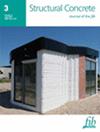斜拉桥索塔锚固区支柱-系杆模型内力的简化预测方法
IF 3.3
3区 工程技术
Q2 CONSTRUCTION & BUILDING TECHNOLOGY
引用次数: 0
摘要
由于局部应力较大,斜拉桥索塔锚固区的力学行为非常复杂。本文介绍了一种支杆-拉杆模型(STM),建议将其作为分析受扰区域的一种有效方法。然而,在 STM 中通过应力积分来预测拉杆构件的内力既费时又低效。为解决这一问题,本文采用了最小应变能原理来分析索塔锚固区的 STM。提出了一种简化方法来评估索塔锚固区的内力。此外,还采用了一座实际桥梁(曹娥江大桥)进行分析,并通过简化方法获得了该桥的预应力钢绞线。为了验证简化方法的准确性,还制作了大桥的全尺寸试验模型。此外,基于简化方法,还研究了 STM 中前壁厚度、内侧开口直线段长度、侧壁厚度、内壁厚度和内侧开口直线段宽度对拉杆内力的影响。结果表明,内开口直线段的长度对所有拉杆构件内力的影响可以忽略不计。与侧壁厚度相比,内壁厚度和内开口直线段宽度对拉杆内力的影响有限。该研究有望促进索塔锚固区的设计。本文章由计算机程序翻译,如有差异,请以英文原文为准。
Simplified method for predicting the internal forces in strut‐and‐tie model of cable pylon anchorage zone in a cable‐stayed bridge
The mechanical behavior of cable pylon anchorage zone in a cable‐stayed bridge is complex due to high localized stresses. A strut‐and‐tie model (STM) has been introduced in this paper, which is recommended as an efficient way to analyze the disturbed region. However, predicting the internal forces in the tie members in the STM by integrating stresses was time‐consuming and inefficient. To address this issue, the principle of minimum strain energy was used to analyze the STM of the cable pylon anchorage zone. A simplified method was presented to assess the internal forces in the cable pylon anchorage zone. Moreover, an actual bridge (Cao'e River Bridge) was employed to be analyzed, and the prestressed steel strands in the bridge were obtained by the simplified method. A full‐scale test model of the bridge was fabricated to validate the accuracy of the simplified method. Furthermore, based on the simplified method, the effect of the thickness of front wall, the length of inner opening straight section, the thickness of side wall, the thickness of inner wall and the width of inner opening straight section on the internal force in the tie members in the STM was studied. The results show that the length of inner opening straight section has negligible effect on the internal forces in all tie members. Compared with the thickness of the side wall, the thickness of inner wall and the width of inner opening straight section have limited effect on the internal force of tie members. This study was expected to promote the design of cable pylon anchorage zone.
求助全文
通过发布文献求助,成功后即可免费获取论文全文。
去求助
来源期刊

Structural Concrete
CONSTRUCTION & BUILDING TECHNOLOGY-ENGINEERING, CIVIL
CiteScore
5.60
自引率
15.60%
发文量
284
审稿时长
3 months
期刊介绍:
Structural Concrete, the official journal of the fib, provides conceptual and procedural guidance in the field of concrete construction, and features peer-reviewed papers, keynote research and industry news covering all aspects of the design, construction, performance in service and demolition of concrete structures.
Main topics:
design, construction, performance in service, conservation (assessment, maintenance, strengthening) and demolition of concrete structures
research about the behaviour of concrete structures
development of design methods
fib Model Code
sustainability of concrete structures.
 求助内容:
求助内容: 应助结果提醒方式:
应助结果提醒方式:


